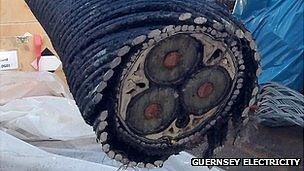Guernsey Electricity helps to finance Jersey undersea cables
- Published

Electricity had to be generated on-island for 18 months while the inter-island cable was repaired
Guernsey Electricity will put almost £30m into a project to build undersea cables to import electricity into Jersey from France.
The £100m project to build a new undersea cable and replace a broken one is due to be completed by 2016.
The company, which has the States as sole shareholder, has been given permission to borrow the money.
A Treasury and Resources Department spokesman said the aim was "greater affordability for consumers".
He said Guernsey Electricity hoped to reduce prices over the next five years but could not make any promises to customers.
Electricity prices rose by 9% in October due to the costs of producing electricity on-island by burning fossil fuels due to the failure of undersea cables in April 2011.
'Improved importation'
Previously, up to 80% of Guernsey's electricity had been imported via undersea cables, which ran between the islands and between Jersey and France, before the failure of an inter-island cable and one of the two linking Jersey to France.
The inter-island cable was restored in October 2012, but the Jersey cable - Normandie 1 - remains out of action.
This has reduced the amount of electricity Guernsey can import to 16 megawatts (MW), which is about 30% of the island's needs.
Treasury and Resources Minister Gavin St Pier said: "The delivery of the Normandie 1 and 3 cables will significantly improve Guernsey's importation capacity through Jersey from its present low level of 16MW to a much improved level of 60MW.
"This new level of import will allow almost 90% of the island's current electricity demand to be sourced via the existing Jersey-Guernsey import cable."
'Security of supply'
He said reducing the need for on-island generation would benefit households and businesses.
A decision on building a second inter-island cable is due to be made by the end of the year and could be installed by the end of 2016.
Guernsey Electricity is also continuing to investigate a direct Guernsey-France cable, which, if given the go ahead, could be built in between eight and 10 years.
Alan Bates, managing director, said: "The investment in greater import capacity and security of import supply is a fundamental part of the Guernsey Electricity strategic plan.
"The ability to have access to the European electricity market allows us to manage tariffs and give greater stability and predictability to our customers.
"Imported power through the new cable infrastructure will come from either low carbon or renewable sources."
He said the cables would also allow the export to Europe of locally generated energy in the future.
- Published21 February 2013
- Published26 October 2012
- Published14 October 2012
- Published8 October 2012
- Published2 October 2012
- Published30 September 2012